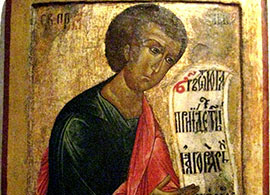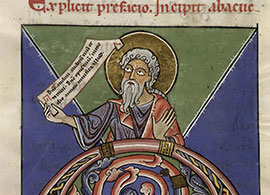Selections From the Prophets Week 7
The Righteous Shall Live by His Faithfulness: Habakkuk 2
By Jeffrey Keuss
Professor of Christian Ministry, Theology, and Culture
Read this week’s Scripture: Habakkuk 2
32:29

 Enlarge
Enlarge
I will stand at my watchpost,
And station myself on the rampart;
I will keep watch to see what he will say to me,
And what he will answer concerning my complaint.
Then the LORD answered me and said:
Write the vision;
make it plain on tablets,
so that a runner may read it.
For there is still a vision for the appointed time;
it speaks of the end, and does not lie.
If it seems to tarry, wait for it;
it will surely come, it will not delay.
Look at the proud!
Their spirit is not right in them,
But the righteous [tṣaḏiyq] will live [ḥāyâ] by their faith [‘emunah].
Moreover, wealth is treacherous;
the arrogant do not endure.
They open their throats wide as Sheol;
like Death they never have enough.
They gather all nations for themselves,
and collect all peoples as their own. (Habakkuk 2:1–5)
The Talmud is a collection of rabbinical discussions that seeks to distill what is essential in every aspect of Jewish life. In a section of the Talmud entitled the Makkot (23b–24a) there is a famous debate seeking to reduce duties of faith to the most basic principle:
- For one rabbi, the summation of the duties is inscribed in what Moses gave Israel in 613 commandments.
- For another rabbi, one needs only turn to how David reduced them to the 11 principles in Psalm 15.
- Another points to how the prophet Isaiah reduced these to the six in Isaiah 33:15.
- Yet another turns to the prophet Micah, who draws the essentials of faith to the three in Micah 6:8.
- Another rabbi goes back to Isaiah seeing how the prophet further reduced these teachings again to two in Isaiah 56:1.
Yet Rabbi Nachman ben Isaac found all of these too complex. The Rabbi asserts that it was the prophet Habakkuk who gave us the one essential commandment in 2:4: “the righteous, by his faithfulness, shall live.” [see Author’s Note 1] Arguably, one of the most important refrains in all of theology, this commission — the righteous, by his faithfulness, shall live — is echoed in Christian Scripture in Romans 1:17, Galatians 3:11, and Hebrews 10:38 as a similarly vital starting point to discover and recover what deep and abiding faith is. It is in Romans 1:17, which restates Habakkuk 2:4, that the German Augustinian monk Martin Luther read and was stopped in his tracks, and subsequently forged a direction that would result in the challenging of one established form of faith and help usher in a new day.
It was this same verse amidst the growing madness of early 20th-century Europe as it lived in fear after World War I and saw the rise of National Socialism and the Nazi party that brought a young Swiss church preacher named Karl Barth to write Der Römerbrief (commentary on the epistle to the Romans) in 1922 to question whether people were taking seriously the role sin plays in our lives.
Barth appeals to the call of faith after the way of Habakkuk as a faithfulness seen most clearly and actualized in the cross of Christ, which is the only hope for a world bent on trusting in the certainty of regimes and propaganda machines. Barth’s patient and faithful reading of Romans ultimately changed the way Protestant churches read Scripture today.
These two significant shifts back to Habakkuk’s call to faithfulness changed not only the church in the modern era but the world at large. Deeply forged in this reading of faithfulness is a call to take seriously the notion that if faith is anything at all it is seeing what is real, testifying to others that what we see is real, and then living, to fullness of our very lives, as if it is real.
In form and tone Habakkuk is noticeably different from any of the other prophetic texts. As opposed to the heritage and background of other prophets we have explored thus far, we know nothing about the prophet’s background. As a shorter prophetic book of merely three chapters, we glean only that he is indeed to be considered a ‘prophet’ — as we hear in 1:1, which is a similar designation found in Haggai 1:1 and Zechariah 1:1. What background reference we do have comes in 1:6, where the prophet mentions “the Chaldeans,” which refers to the Neo-Babylonian Empire that came to power in the latter part of the seventh century B.C. and held Jerusalem until 538 B.C. [see Author’s Note 2]

 Enlarge
Enlarge
What is most striking to read is the boldness of Habakkuk in bringing complaint to God. From the first chapter, we hear the strong admonition to YHWH directly questioning why God doesn’t act on behalf of his people in times of evil. As noted by Gerhard von Rad, the first part of Habakkuk “consists of an almost liturgical dialogue between the prophet and Yahweh. The prophet twice lays a complaint before Yahweh, and Yahweh twice answers.” [see Author’s Note 3]
In this way the tone and flow of the language has more in common with psalms of lament such as Psalms 5:4–5; 13:1-2; 74:10; 73, and 89:46. [see Author’s Note 4] Given the employment of poetic language of lamentation and the direct discourse with God, some scholars speculate that the prophet is perhaps involved in the worship life of the people as the poetry in these laments has a musical quality germane to temple worship. The basic flow of the book is acknowledged fairly uniformly by most scholars as three movements:
- 1:2–2:5 offers complaints to God where responses are given;
- 2:6–20 begins an oracle of woes to those who do not heed the word of the Lord;
- 3:1–19 offers a psalm of lament and promise.
The first movement has the prophet stating that those who are righteous have been surrounded and swallowed up by the “wicked,” and is framed in a complaint similar in tone and scope to that found in Habakkuk 1:2: “How long shall I cry for help and you will not listen?”
This is voiced in a two-part complaint from Habakkuk: first there is the complaint that God is simply nonresponsive to the cries of the people (1:2–4), which leads into the second complaint, that God promised to raise up the Chaldeans in order to punish the wrongdoers and provide liberty for the oppressed, yet their presence is perhaps more onerous than the cure they are to exact. As Habakkuk muses in 1:12–13, 15:
Are you not from of old,
O Lord my God, my Holy One?
You shall not die.
O Lord, you have marked them for judgment;
and you, O Rock, have established them for punishment.
Your eyes are too pure to behold evil,
and you cannot look on wrongdoing;
why do you look on the treacherous,
and are silent when the wicked swallow
those more righteous than they?
…
The enemy brings all of them up with a hook;
he drags them out with his net,
he gathers them in his seine;
so he rejoices and exults.
After Habakkuk raises his concerns, we hear the important aside that is embedded in Chapter 2 and central to our reading and reflection this week: the righteous shall live by faith.
This verse is rendered in only three words in Hebrew, and as such offers a multifaceted reading as we heard in the Talmudic reflection — the righteous (ṣadîq) [see Author’s Note 5] will live (ḥāyâ) [see Author’s Note 6] by faith (ʾĕmûnāh) [see Author’s Note 7]. As much as we are called to have faith, we are also reminded that “by his faithfulness” we shall live. It is a two-way street whereby our faith is in God’s faithfulness.
Scholars have puzzled over the antecedent of the pronoun in this verse: is it the fidelity of the righteous one himself that is raised up, or the fidelity of the vision for nourishment and care provided by God? What is certain is that both are needed — the provider of all good things and the humble petitioner who is the vessel for grace and mercy to flow into. The word for “faith” in Hebrew here is ʾĕmûnāh, which is derived from the root word ʾāman meaning “nourish,” “restore,” and “give the promise of life.”[see Author’s Note 8]
In this regard, faith is something that grows us, strengthens us, builds us up, and transforms us. This is a full-bodied nourishment that is different from merely rational beliefs. Ӗmûnāh points towards a lifestyle more than mere belief for fidelity, trust, and utter dependence. This is the life to which we are called, a life not of will power but of trust in the faithfulness of God. One of the names of God in the Old Testament is El ʾĕmûnāh — “the Faithful God” — and it is this God to whom Habakkuk points those who would be righteous — ṣadîq.
So much turns on this assertion. To have faith in faithfulness that transcends the pain and suffering of our lives and the lives of others is a challenge to say the least. As Habakkuk resolves his complaint in the form of a psalm in Chapter 3, and the dust settles amidst the tumult of his complaint, we hear these words: “Yet I will rejoice in the LORD; I will exult in the God of my salvation. God, the LORD, is my strength; he makes my feet like the feet of a deer, and makes me tread upon the heights.” (3:18-19)
This is a clear-eyed resolve to choose to trust in nourishment and provision that will surpass the strife, disappointment, anger, fury, and idealism of the culture in which many find themselves. It is a challenge to embrace a deeper contentment and provision that some will not recognize unless the fruits of the transformation show forth in our lives.
Perhaps this is why Habakkuk ends with a call to joy and exultation to rise above the screams, violence, greed, and nihilism in order to take a longer and more abiding view of things. Beyond the immediacy of our situation is the event horizon of the faithful God, whose faithfulness calls out faith in us in the form of righteousness and action to help the world find hope for such a time as this.
Questions for Further Reflection
- Have you ever thought about trying to distill your most foundational belief to the bare essentials, as the rabbis do in the Talmud? What elements would compose your core statement of belief? How does it compare to the assertion that Habakkuk makes in 2:4?
- The Lectio writer notes that much of this short book consists of complaint or lament before God. What does this example teach about the role of lament in the life of faith? If you feel led, consider writing a prayer of lament about the condition of our world today or perhaps a situation that is even closer to home.
- In the midst of lament, Habakkuk reminds readers about the centrality of faith. How would you define faith? What does the Lectio writer say about two different aspects of faith found in 2:4? What might it look like for you to push more fully into both of these demonstrations of faith?
- Despite his lament, Habakkuk ends his writing on a note of hopefulness (3:18-19). How do you respond to this? Do you find his example compelling or trite? Challenging or encouraging? Spend some time in prayer, considering how God is calling you to respond to difficulties in your life, whether past, present, or future.
<<Previous Lectio Back to Selections From the Prophets Next Lectio>>

This work is licensed under a Creative Commons License.





The themes of knowing God and living by faith in God, as treated by Dr. Kuess in this and last week’s lectio guide, have been of tremendous value and joy to me. I deeply appreciate how these have spoken to my spirit. Thank you, Dr. Kuess.